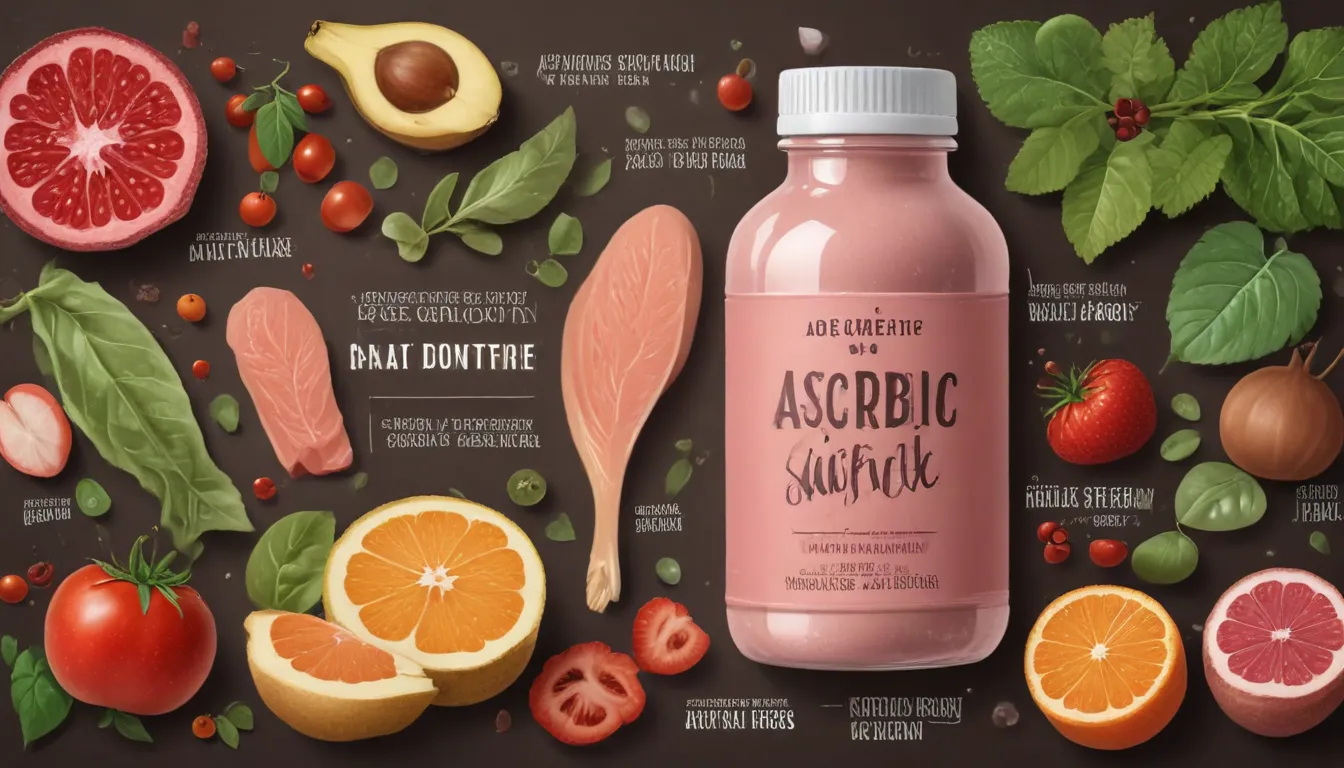The pictures in our articles might not always show exactly what the text is talking about. We use these images to make the article more interesting and eye-catching. They are there to add to the text, but not to replace it or show every detail.
Welcome to our informative guide on ascorbic acid nutrition facts! Ascorbic acid, also commonly known as vitamin C, is a vital nutrient that our bodies need for optimal health. In this article, we will delve into the essential role of ascorbic acid in maintaining a healthy body and immune system. From its antioxidant properties to its role in collagen synthesis, we will explore the fascinating world of this powerful vitamin and how it contributes to overall well-being. So, let’s uncover the valuable information about ascorbic acid and how you can incorporate it into your diet to support your health.
Key Insights Into Ascorbic Acid Nutrition:
- Ascorbic acid, also referred to as Vitamin C, is crucial for a strong immune system, healthy skin, and disease prevention.
- It acts as a superhero for your body, aiding in nutrient absorption and defending against illnesses.
- Remember, cooking can diminish its potency, so enjoy your fruits and vegetables in their raw or lightly cooked form!
The Wonder Vitamin: Ascorbic Acid (Vitamin C)
Ascorbic acid, also known as Vitamin C, is not produced by our bodies and must be obtained from dietary sources. This water-soluble vitamin plays a pivotal role in various bodily functions, including supporting the immune system and collagen production for healthy skin and tissues.
The Antioxidant Powerhouse: Ascorbic Acid
One of the remarkable benefits of ascorbic acid is its antioxidant properties. Acting as a shield against oxidative stress caused by free radicals, this vitamin helps protect our cells from damage, thereby combatting aging and disease.
Immune Support: Ascorbic Acid in Action
Consuming adequate amounts of ascorbic acid can boost our immune system by enhancing the production of white blood cells, crucial for fighting off infections and diseases. Including vitamin C-rich foods in your diet can strengthen your body's natural defense mechanisms.
Collagen Synthesis: Ascorbic Acid’s Secret Weapon
Collagen is a vital protein that provides structure and support to our tissues. Ascorbic acid plays a significant role in collagen synthesis, promoting healthy skin, bones, and connective tissues. Including this vitamin in your diet can support overall tissue health.
Iron Absorption Booster: Ascorbic Acid’s Role
Iron is an essential mineral required for red blood cell production and oxygen transport. Ascorbic acid aids in improving iron absorption, particularly from plant-based sources. This makes it a key nutrient for individuals following a vegetarian or vegan diet.
Nutrient-Rich Sources of Ascorbic Acid
You can find ascorbic acid in a variety of fruits and vegetables, such as citrus fruits (oranges, grapefruits), kiwi, strawberries, broccoli, bell peppers, spinach, and kale. Including these foods in your daily meals can help meet your vitamin C needs.
Handle With Care: Preserve Ascorbic Acid
Ascorbic acid is heat-sensitive and can be destroyed by cooking. To retain the vitamin's potency, it is best to consume foods containing ascorbic acid either raw or lightly cooked. Excessive heat or prolonged cooking can diminish its effectiveness.
Preventing Deficiency: The Importance of Ascorbic Acid
A deficiency in ascorbic acid can lead to scurvy, a condition characterized by symptoms such as fatigue, swollen gums, joint pain, and impaired wound healing. Ensuring an adequate intake of vitamin C is essential to prevent this deficiency-related illness.
Disease Prevention: Ascorbic Acid’s Protective Influence
Research suggests that sufficient intake of ascorbic acid may reduce the risk of chronic diseases like heart disease, certain cancers, and age-related macular degeneration. Including this vitamin in your diet can have long-term health benefits.
The Power of Absorption: Ascorbic Acid’s Assistive Role
Ascorbic acid can enhance the absorption of various nutrients, including calcium and folate. By consuming foods rich in vitamin C, you can optimize the absorption of these essential nutrients, supporting overall health and well-being.
The Human Dilemma: Inability to Produce Ascorbic Acid
Unlike some animals, humans cannot internally produce ascorbic acid. Therefore, it is imperative to obtain an adequate amount of this vitamin through diet or supplements to meet our body's requirements for optimal health.
In Summary
Understanding the vital nutrition facts of ascorbic acid is key to maintaining a healthy diet and lifestyle. With its numerous benefits, including immune support, collagen production, and antioxidant protection, ascorbic acid is a fundamental nutrient for overall well-being. Remember to include vitamin C-rich foods in your daily meals but consult a healthcare professional before starting any new dietary regimen, especially with supplements. By incorporating ascorbic acid wisely into your diet, you can support your health and vitality.
Frequently Asked Questions (FAQs) About Ascorbic Acid:
-
What is ascorbic acid?
Ascorbic acid, also known as vitamin C, is a water-soluble vitamin that acts as an antioxidant in the body. It is essential for collagen synthesis, tissue repair, and immune function. -
What are the benefits of consuming ascorbic acid?
Consuming ascorbic acid supports immune health, wound healing, skin integrity, iron absorption, and antioxidant protection against free radicals. -
How much ascorbic acid do I need daily?
Daily recommended intake of ascorbic acid varies by age, sex, and individual health status. Consulting a healthcare professional for personalized advice is recommended. -
Can I get enough ascorbic acid from food sources alone?
Yes, you can obtain sufficient ascorbic acid from a balanced diet rich in fruits and vegetables. Citrus fruits, berries, and leafy greens are excellent sources of this vital nutrient. -
Are there any risks associated with ascorbic acid consumption?
While ascorbic acid is generally safe, excessive intake through supplements may lead to digestive issues and other complications. Following recommended guidelines and seeking professional advice is essential.
Trust in our commitment to providing accurate and engaging content as you explore and learn with us. Each fact shared here is contributed by real users like yourself, ensuring a wealth of diverse insights and information. Rest assured that our dedicated editors uphold high standards of accuracy and authenticity in all the content we provide. Thank you for joining us on this journey of discovery and education.






